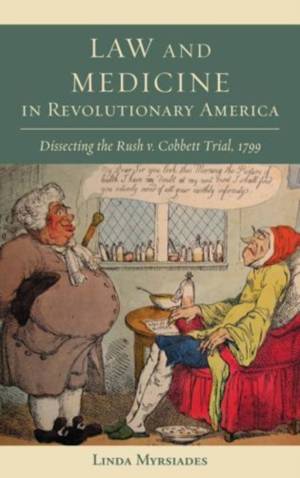
- Afhalen na 1 uur in een winkel met voorraad
- Gratis thuislevering in België vanaf € 30
- Ruim aanbod met 7 miljoen producten
- Afhalen na 1 uur in een winkel met voorraad
- Gratis thuislevering in België vanaf € 30
- Ruim aanbod met 7 miljoen producten
Zoeken
Law and Medicine in Revolutionary America
Dissecting the Rush V. Cobbett Trial, 1799
Linda Myrsiades
€ 206,45
+ 412 punten
Omschrijving
Law and Medicine in Revolutionary America: Dissecting the Rush v. Cobbett Trial, 1799 offers the first deep analysis of the most important libel trial in post-revolutionary America and an approach to understanding a much-studied revolutionary figure, Benjamin Rush, in a new light as a legal subject. This libel trial faced off the new nation's most prestigious physician-patriot, Benjamin Rush, against its most popular journalist, William Cobbett, the editor of Porcupine's Gazette. Studied by means of a rare and substantial surviving transcript, the trial features six litigating counsel whose narrative of events and roles provides a unique view of how the revolutionary generation saw itself and the legacy it wished to leave to its progeny. The trial is structured by assaults against medical bleeding and its premier practitioner in yellow fever epidemics of the 1790s in Philadelphia, on the one hand, and castigates the licentiousness of the press in the nation's then-capital city, on the other. As it does so, it exemplifies the much-derided litigiousness of the new nation and the threat of sedition that characterized the development of political parties and the partisan press in late eighteenth-century America.
Specificaties
Betrokkenen
- Auteur(s):
- Uitgeverij:
Inhoud
- Aantal bladzijden:
- 294
- Taal:
- Engels
- Reeks:
Eigenschappen
- Productcode (EAN):
- 9781611461022
- Verschijningsdatum:
- 18/05/2012
- Uitvoering:
- Hardcover
- Formaat:
- Genaaid
- Afmetingen:
- 150 mm x 236 mm
- Gewicht:
- 544 g

Alleen bij Standaard Boekhandel
+ 412 punten op je klantenkaart van Standaard Boekhandel
Beoordelingen
We publiceren alleen reviews die voldoen aan de voorwaarden voor reviews. Bekijk onze voorwaarden voor reviews.











